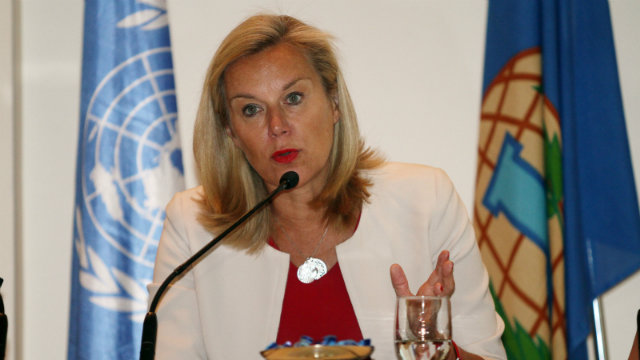SUMMARY
This is AI generated summarization, which may have errors. For context, always refer to the full article.

THE HAGUE, Netherlands – The last of Syria’s declared chemical weapons have been shipped from the war-torn country and are en route for destruction at sea, the world’s chemical weapons watchdog said on June 23, Monday.
“As we speak, the ship (carrying the last chemicals) has just left the port (of Latakia),” Ahmet Uzumcu, head of the Organization for the Prohibition of Chemical Weapons, said at a press conference in The Hague.
“Removing the stockpile of precursor and other chemicals has been a fundamental condition in the program to eliminate Syria’s chemical weapons programme,” Uzumcu said. (READ: ‘Destory chemical weapons at sea’)
Syria had previously shipped out 92% of its stockpile of chemical weapons under the terms of a UN-backed and US-Russia brokered agreement last year. (READ: Chemical weapons are a ‘war crime’)
But the remaining 8% of the stockpile remained at one site and Damascus said it was unable to transport it to the port of Latakia because of security concerns.
“While a major chapter in our endeavors closes today, OPCW’s work in Syria will continue,” Uzumcu said.
“We hope to conclude soon the clarification of certain aspects of the Syrian declaration and commence the destruction of certain structures that were used as chemical weapons production facilities.”
The Syrian foreign ministry confirmed that “the final cargo of chemical agents has today been taken outside Syrian territory.”
The Dutch head of the joint OPCW-UN mission, Sigrid Kaag, hailed the end of “the most operationally challenging task within the effort to eliminate the Syrian chemical weapons program.”
“We hope that our contribution will ultimately make a meaningful difference for the Syrian people and the region,” Kaag said.
Under last year’s agreement Syria had until the end of June for the destruction of its chemical weapons, but it has been widely acknowledged that the deadline would not be met.
The deal was reached after a sarin nerve gas attack in a rebel-held Damascus suburb killed around 1,400 people. Damascus agreed to hand over its chemical arsenal after the US threatened airstrikes against President Bashar al-Assad’s regime in response.
A Danish ship is now to take the chemicals for transhipment in Italy’s port of Gioia Tauro to the US ship Cape Ray for destruction at sea, while some chemicals are to be destroyed at sites including in the US and Britain.
Uzumcu hailed the disarmament mission as “a major undertaking marked by an extraordinary international cooperation.”
“Never before has an entire arsenal of a category of weapons of mass destruction been removed from a country experiencing a state of internal armed conflict,” he said.
“Although there were delays in the process, the cooperation of the Syrian Arab Republic has been commensurate with the requirements of the decisions,” Uzumcu said.
However, an OPCW investigation team said last week that chemical agents such as chlorine, which Syria was not obliged to hand over, have recently been used in Syria “in a systematic manner”.
Assad’s regime and rebels have both accused the other of using chemical agents, including chlorine, in the bloody uprising that began in March 2011 and in spite of Damascus promising to hand over all its chemical arms.
An OPCW team probing the allegations was attacked with a roadside bomb and gunfire on May 27, preventing them accessing the site of an alleged attack in the village of Kafr Zeyta.
Despite not being able to visit the alleged site of the chlorine attack, OPCW officials spoke to doctors in Kafr Zeyta “and obtained their verbal medical reports relating to the treatment of individuals allegedly affected by exposure to chlorine.”
The chlorine probe came after France and the United States alleged that Assad’s forces may have unleashed industrial chemicals on several rebel-held villages in recent months.
Syria did not have to declare its stockpile of chlorine — a weak toxic agent that can be considered a chemical weapon if used offensively — as part of the disarmament deal as it is widely used for commercial and domestic purposes. – Rappler.com
Add a comment
How does this make you feel?
There are no comments yet. Add your comment to start the conversation.